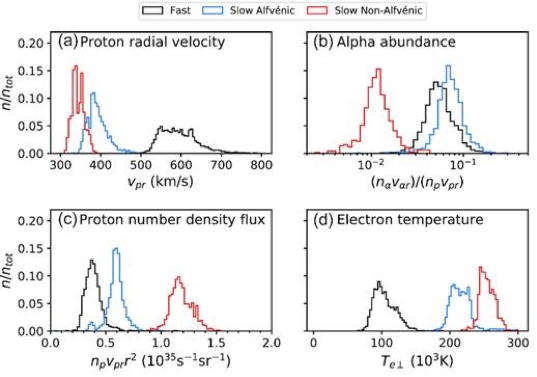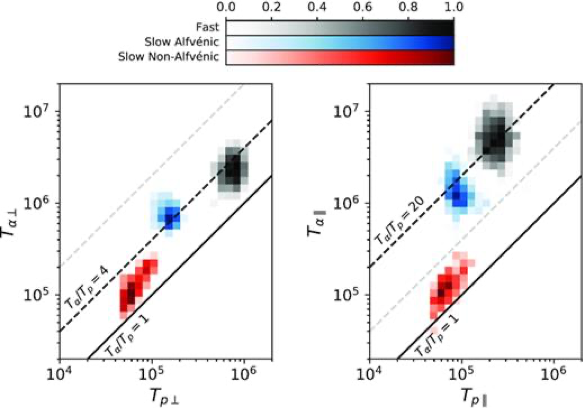MIST
Magnetosphere, Ionosphere and Solar-Terrestrial
Where does slow Alfvénic solar wind come from?
By David Stansby (MSSL, UCL)
The solar wind is a continuous flow of plasma from the surface of the Sun, flowing out into interplanetary space. Faster solar wind is known to originate in large coronal holes, but slower solar wind has a wide range of different sources. A subset of slow solar wind is filled with pure Alfvén waves, much like the fast solar wind, suggesting it has a similar origin in coronal holes.
In our study we tested this theory of coronal hole origin, using Helios in-situ measurements of the solar wind at 0.35 AU. Figure 1 shows a wide range of plasma properties in typical fast solar wind (black), highly Alfvénic slow solar wind (blue), and non-Alfvénic slow wind (red).


Figure 1: In-situ solar wind properties for three intervals of solar wind, measured at 0.35 AU. The three types of solar wind are Fast (black), Slow Alfvénic (blue), and Slow non-Alfvénic (red).
The fast and Alfvénic slow wind had similar
- Alpha particle abundances
- Alpha particle drift speeds
- Alpha particle temperature anisotropies
- Alpha to proton temperature ratios (in both parallel and perpendicular directions)
These similarities imply that the heating and acceleration mechanisms of fast and slow Alfvénic solar wind are qualitatively similar, acting in the same way on protons and alpha particles. This agrees with the theory that slow Alfvénic wind originates in coronal holes, like fast solar wind.
In contrast, the fast and Alfvénic slow wind had different
- Electron, proton, and alpha particle temperatures
- Mass fluxes
These differences can be explained by different magnetic field geometries in the low corona: slower wind is released on magnetic field lines which undergo more expansion in the corona, increasing the mass flux and reducing the temperatures. This implies that whilst slow Alfvénic wind originates in coronal holes, it most probably originates in small coronal holes.
For more information, please see:
The origin of slow Alfvénic solar wind at solar minimum, Monthly Notices of the Royal Astronomical Society 492, 39–44 (2020), D Stansby, L Matteini, T S Horbury, D Perrone, R D’Amicis, L Berčič, https://doi.org/10.1093/mnras/stz3422